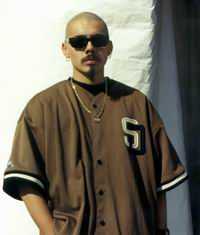Lil Rob knows that many rap fans have a hard time relating to artists who constantly glorify hard to obtain material items. Thats why the legendary San Diego rapper chooses to remain rooted in reality. With a string of successful underground albums from 1997 "Crazy life" to 2000 "Natural high/high till I die" Lil Rob has become a favorite in Los Angeles, Phoenix and has native San Diego, largely because of his honest raps about everyday life.
The gifted rhymer delivers another intoxicating batch of hits with his new and most potent album to date, "Lil Rob" on Upstairs Records. "Im still the Rob from my other jams," he explains. "My fans like me because they're hearing something thats not talking about being a player because I'm not. I'm not talking about bling bling and rings, because I don't. I'm talking about having low riders because I do. I like to get a twelve pack and come back and kick back with my friends. I wear T-shirts with Levis, Dickies. I'm just your regular homeboy."
"Brought up in a small neighborhood" one of the most satisfying selections on "Lil Rob" will have car enthusiasts from coast to coast saluting to Robs latest anthem. Rob became a car fanatic because of his cousin Albert from Los Angeles, who is the vice president of the Lifestyles Car Club. Rob decided to turn his life long fascination with cars into a song.
"Its about my cars," Lil Rob says of the cut, "The first verse is about my 63 the second verse is about my 49 truck and the last verse is about my Cadillac. A lot of rappers rap about low riders and don't even have one. I'm just rapping about my cars for real,"
Rob keeps the classic samples coming on "They call me Lil Rob," which incorporates 'The Cadillacs' "Speedoo" and "Street days," which uses 'Chuck Berrys' "School days" as its foundation. Lil Rob takes his music so seriously because it has become a life long passion, while in the third grade he started break dancing. With a DJ brother, a singing dad and a grandmother who also sang, Rob was surrounded by music.
Although he enjoyed going to local parties he started staying home in order to write raps. "I would rap just to rap," Rob recalls. "A couple of my homeboys heard it and said 'lets go to the studio and see what comes out.' People started hearing it and liking it, hearing a little sixteen year old talking about the streets, which is something you didn't hear back then. I kept it true to where I'm from."
Lil Robs entry to the rap world came on the 1992 single "Oh what a night" b/w "Mexican gangster." Only 16 at the time Lil Rob was simply happy to have his music in the marketplace. Over the next several years Lil Rob would release a string of albums, many of which were bootlegged because of heavy demand. Without radio play "Crazy life" sound scanned at 60,000 while "Natural high/till I die" sold 90,000. Some of his standout cuts included "Natural high" which featured him rapping slow over a slow beat about smoking solo "Wicky wicked" a track about people trying to stop him succeeding and "I remember," where he talked about growing up in San Diego.
This type of thematic diversity helped earn Lil Rob a legion of dedicated fans who appreciate his earnest approach to song writing. "I'm not trying to be something I'm not," Lil Rob says. "I tell it like it is, with "Crazy life" I got a little crazy, with "Natural high" I grew up a little bit. With this one I've grown up even more. I've got more skills and I'm just the homeboy next door doing the same things that everyone else does."
With a string of underground classics, a nation of fans and a new deal with Upstairs Records to support him, Lil Rob is ready to build upon his already sizable fan base with his most thorough release to date "Lil Rob." Rob knows that fans will appreciate his new sounds.
Source: http://www.fortunecity.com/skyscraper/resedit/33/id57.htm
